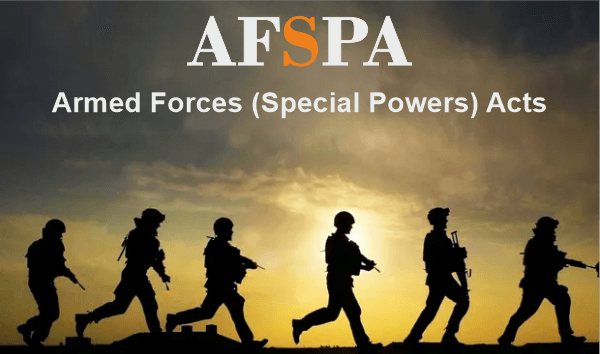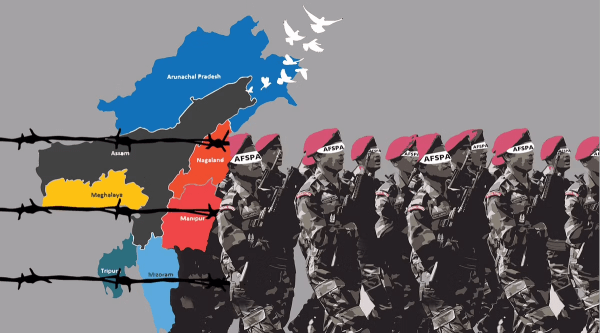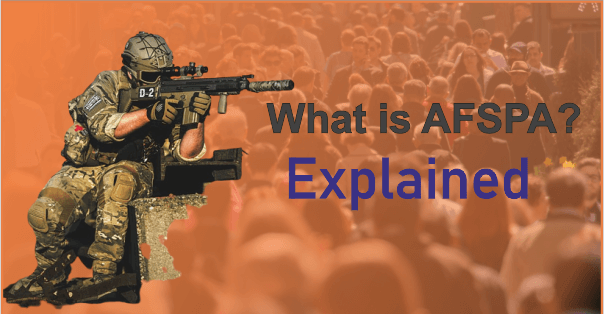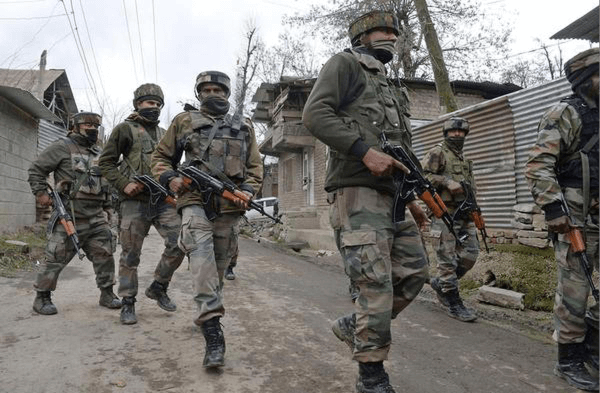What is the Full Form of AFSPAAFSPA: Armed Forces Special Powers ActAFSPA stands for Armed Forces Special Powers Act. The Indian Armed Forces are granted extra permission to maintain law and order in "disturbed regions" under the Armed Forces Special Powers Act (AFSPA), which the Indian Parliament established in 1958. The Unsettled Sites (Special Courts) Act of 1976 stipulates that a location should have stayed "disturbed" for a minimum of six months after being given that status. 
The other Seven Sister States in north-eastern India was gradually added to its scope over the coming decades. Now, it is in effect in some northeast states that border Assam State. Nearly 14 years after it went into effect, a 1983 law that applied to Punjab and Chandigarh was rescinded. A law approved in 1990 has been in effect since they implemented it in Jammu and Kashmir. Several sections have criticized the acts for purported worries about human rights breaches in the alleged areas of its enforcement. Some national politicians favoured repealing the AFSPA, while others like Amarinder Singh are against it. 2022: Forces have been reduced in several North eastern regions. For the first time since 1954, no Army squad of the size of a battalion is being used for operations. Only one brigade now does the same task. However, some remaining army forces have been sent to the border regions. HistoryTo stop the Quit India Movement, the British colonial Government passed the Armed Forces Special Powers Ordinance of 1942 on August 15, 1942. The Indian Government implemented four ordinances in 1947 to manage the national internal security concern caused by India's division. The Central Government of India has the authority under Article 355 of the Indian Constitution to safeguard every State against internal unrest. Act of 1958 granting special military authority to Assam and ManipurThe Naga National Council Nation was founded in 1951. There was a boycott of the 1952 first general election, which subsequently included government personnel and schools. The Assam government implemented the Assam Maintenance of Public Order (Autonomous District) Act in Naga Hills in 1953 to address the problem, and they stepped up police operations against the insurgents. Assam established the Assam Disturbed Areas Act of 1955, which provided a legal framework as the situation deteriorated and the Assam Rifles were sent to the Naga Hills for the armed state police and paramilitary groups to fight the insurgency in the area. 
However, the Assam Rifles and the State's military police could not quell the Naga uprising. A parallel government is known as "The Federal Government of Nagaland" was founded on March 23, 1956, by the rebel Naga Nationalist Council (NNC). Only the Governors of States and the Executives of Union Territories can notify locations in the relevant State or the Union Territory, according to the Armed Forces (Assam and Manipur) Special Powers Act of 1958 for the term "disturbed". The "Objects and Reasons" section of the law states that this power was provided because of following reasons:
The seven north eastern states of Assam, Manipur, Meghalaya, Nagaland, Tripura, Arunachal Pradesh, and Mizoram were included in the act's extended geographical scope. The abbreviation AFSPA, 1958 was used since it was known as the "Armed Forces (Special Powers) Act, 1958" rather than "The Armed Forces (Assam and Manipur) Special Powers Act, 1958." The contentious law was recently withdrawn by the Tripura state administration, which justified the sharp decline in terrorist activity in the region. The AFSPA in Nagaland state was expanded by one additional year in June 2015 following the review. The AFSPA was extended by the Indian Government in November 2016 to three Arunachal Pradesh districts: Tirap, Changlang, and Longding. In April 2018, they again extended the duration in the three districts mentioned earlier of Arunachal Pradesh by an additional six months. Following Section 3 of the AFSPA, they have been appointed as "disturbed areas." The National Socialist Council of Nagaland (Isak-Muivah) and the NSCN (Khaplang), two underground Naga groups, were active in these districts and engaged in extortion, local recruiting, and hostility. The Special Powers of the Armed Forces (Punjab and Chandigarh) Act, 1983To allow the central military forces to conduct operations in the State of Punjab and the union territory of Chandigarh, the Federal Government passed the Armed Forces (Punjab and Chandigarh) Special Powers Act on October 6, 1983, abolishing the previous law. Except for two parts that gave the armed forces new authority, the terms of the legislation mostly remained the same as those of the Armed Forces Special Powers Act (Assam and Manipur) of 1972. On October 15, 1983, the law became operative throughout Chandigarh and Punjab. Section 4 was amended to add Subsection (e), which states that any vehicle may be forcibly stopped, searched, and confiscated if it is believed to be carrying proclaimed criminals or weaponry. They amended the statute to include Section 5, which states that a soldier has the authority to unlock any locks "if the key thereto is withheld." After being in existence for about 14 years, they repealed the legislation in 1997. The Disturbed Areas Act, however, remained in effect in Chandigarh until the High Court invalidated it in 2012. Act of 1990 Granting Special Powers to the Armed Forces (Jammu and Kashmir)In September 1990, the Armed Forces (Jammu and Kashmir) Special Powers Act was passed. They may implement this act if the Central Government or the Governor of Jammu and Kashmir believes that all or a portion of the Union Territory is in such a chaotic and hazardous state or weaponry. The ActThe Indian Constitution's Articles grant state governments the authority to proclaim a state of emergency for one or more of the following reasons:

AFSPA is used when an ongoing disturbance, such as militancy and insurgency, and especially when borders are in danger. In most situations, like during elections, when the local police may be overworked and unable to manage all of the duties, the federal Government complies by dispatching the BSF and the CRPF. These situations do not fall under the AFSPA's domain. Only when a state, or a portion of it, is designated as a "disturbed region," may AFSPA be put into effect. In such cases, the state government is permitted to request aid from the Federal Government. They gave the Central Government the authority to declare regions disturbed by Act 7 of 1972. Soldiers are nonetheless subject to the same chain of command as they would be in a conflict zone, even though they do not have access to legal cash in a civilian environment. The troops' supervisors and themselves are untrained in civil law or policing techniques. To legitimate the presence and actions of the armed forces, which is where and why the AFSPA comes into play. For the forces that have been designated as warlike in emergency scenarios, an officer of the armed forces has the following authority under the Armed Forces Special Powers Act (AFSPA) in a region that has been designated as "disturbed":
The Supreme Court of India concluded the armed force's exemption from prosecution under the AFSPA on July 8, 2016, in a landmark decision. The rule is exact for both and spreads equally to both. This is a prerequisite of democracy and needs to maintain the rule of law and protect individual liberty. 
Areas that Presently Apply itCurrently, only 31 districts in 4 North eastern states are entirely and 12 partially covered under the AFSPA. Views and commentary from non-state sourcesUnited Nations ViewsMembers of the UNHRC raised various concerns regarding the legality of the AFSPA when India gave its second periodic report to the UNHRC in 1991. In light of Article 4 of the International Covenant on Civil and Political Rights, they questioned the AFSPA's legitimacy under Indian law and demanded an explanation of its justification. ICCPR, On March 23, 2009, India was requested to remove the AFSPA Navanethem Pillay, the UN Commissioner for Human Rights. The statute, according to her, "breaches current international human rights norms and is from the colonial era". The UN requested India to repeal AFSPA on March 31, 2012, claiming it has no place in Indian democracy. Arbitrary Executions Christof Heyns stated, "I was told that AFSPA is "hated" and "draconian" while I was in Kashmir. It goes against international law. Numerous UN treaty committees have also declared it against international law." Analysis by non-governmental groupsHuman Rights Watch has attacked the law as an "instrument of governmental misuse, tyranny, and discrimination." The Government's need for more force contributes to the issue. This line of thinking is an example of the vicious circle that the AFSPA has created in the North East. The application of the AFSPA drives the need for more autonomy. It gives the people of the North East more justification to wish to leave a state that grants such powers. The ensuing agitation continues to support the use of the AFSPA from the Indian Government's perspective - The South Asian Human Rights Documentation Center According to a study by the Institute for Defense Studies and Analysis, security forces have attacked people in Manipur on many occasions after adopting the act. According to the study, locals think that the amnesty granted to security personnel encourages them to behave more harshly. However, the article states that the act's repeal or gradual abolition will promote insurgency. Irom Chanu Sharmila (the fair one) is an Indian poet and champion of human rights. She started a hunger strike on November 2, 2000, lasting for 16 years, ending on August 8, 2016. Ten people were shot and murdered on November 2, 2000, in Malom, a town in Manipur's Imphal Valley while they were waiting at a bus stop. The "Malom Massacre" incident is thought to have been conducted by one of the Indian paramilitary groups active in the region, the Assam Rifles. 
In addition, several human rights groups have made allegations of disappearances happened in Kashmir by the army or the police as on January 2009, a soldier stood to watch at the roadside checkpoint near Srinagar International Airport. Amnesty International and Human Rights Watch (HRW) are just two of the many human rights organizations that have denounced police abuses of human rights in Kashmir, including "extrajudicial executions," "disappearances," and torture. To conduct counter in surgency operations, the military is given extensive arresting authority under the Armed Forces Special Powers Act (AFSPA) and the ability to shoot and kill. According to Indian government representatives, the army is sent into action only when armed combatants pose a real threat to national security. They claim that such conditions need taking extreme action. The Public Safety Act should be abolished, claim human rights organizations, since "a person may be kept in administrative custody for a total of two years without a court decision." Dr. Sandeep Pandey, and several more are among the activists working in J&K for peace and human rights. They all agree that the best way to achieve peace is via interpersonal interaction and the creation of new channels, yet laws like the AFSPA consistently violate those rights. According to legal activist and professor Babloo Loitongbom, "What the Indian State has failed to comprehend is that such tiny, ethnic communities are battling the Indian state for 55 years."
Next TopicFull Form
|
 For Videos Join Our Youtube Channel: Join Now
For Videos Join Our Youtube Channel: Join Now
Feedback
- Send your Feedback to [email protected]
Help Others, Please Share










